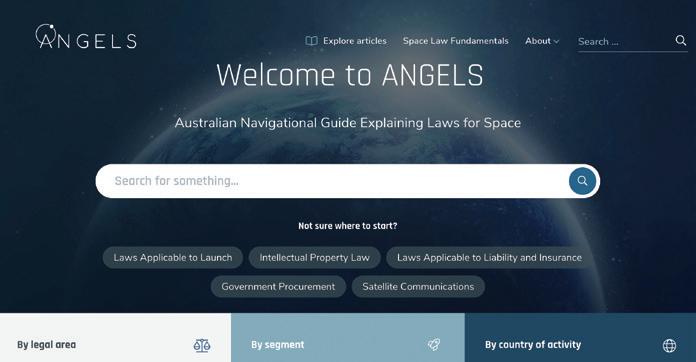
4 minute read
ANGELS project creates one stop shop for space laws – By Alice Osborne
ANGELS Project creates one stop shop for space laws
ALICE OSBORNE, HONOURS STUDENT, ADELAIDE UNIVERSITY LAW SCHOOL
Advertisement
The space technology industry is not by nature filled with those with an extensive law background, and yet so often participants in this field must try to navigate complex legal problems regarding space projects. The Australian “Navigational” Guide Explaining Laws for Space (ANGELS) project has been created to equip these entrepreneurs with a “first port of call” when they encounter legal problems. In the form of a website, available at spacelaws.com.au, the ANGELS project provides information on a range of topics in the field of space law, both domestic and international, ranging from government procurement, to liability and insurance, to intellectual property.
The ANGELS project was an initiative of Adelaide Law School, in collaboration with Duncan Blake, currently undertaking doctoral research within the Adelaide Law School on a related topic and Special Counsel on Space Law for the International Aerospace Law & Policy Group, and supported by a grant from the Law Foundation of South Australia. Six high-achieving undergraduate students from Adelaide Law School were chosen to facilitate the creation of content for the website. Under Duncan’s leadership, Alice Osborne, Nicholas Garbas, Claudia Floreani, Chloe Evans, Brian Lian, and Peter Dalrymple spent Semester 1 of 2019 undertaking comprehensive legal research, conducting interviews with spacetechnology entrepreneurs and industry participants, giving presentations at Space Hubs around Australia, and finally creating the necessary content for the website. With an often-grueling schedule, including a nine-day “tour” encompassing six capital cities, and sometimes entirely new legal topics, the students were pleased to launch the website on 2 September, 2019 to coincide with the commencement of the Space (Launches and Returns) Act 2018 (Cth). During the interviews undertaken by each student with space technology entrepreneurs (33 in total) it was found that often these entrepreneurs gave only a little thought to their legal obligations before pursuing their research and developing their technology and projects. It was found that this approach can create problems further (or too late) in the process – for example, an entrepreneur may find that their technology is inherently incapable of complying with pertinent legal parameters. Alternatively, other entrepreneurs reported that although they understood that they must comply with various legal regimes, the specific details of these obligations were extremely difficult to find and were scattered across multiple websites and platforms, without clear signposting or ability to make speedy enquiries. It is therefore the hope of the ANGELS team that these beleaguered entrepreneurs will now be able to access the ANGELS website at the start of their project, find and understand relevant legal information, and seek external legal advice if appropriate to do so.
The ANGELS website encompasses a broad range of legal topics, distilling them into content that a layperson may understand. The topics included (as applicable to space technology) are: • Space law fundamentals; • Legal services for space activities; • Regulators of space activities; • Aviation law; • Australian export control laws; • Government procurement; • Intellectual property; • Liability and insurance; • Laws applicable to launch; • Spectrum regulation; • Hybrid-aerospace vehicles; • Satellite communications; • Laws applicable to remote sensing; • Position, navigation, and timing; and • Laws applicable to space situational awareness (SSA). Additionally, the licensing regimes of France, India, the United Kingdom, the United States, China, and New Zealand were compared to that of Australia, as Australia currently has no commercial space ports from which to launch a rocket into orbit (although this may change in the near future). For ease of comprehension, these topics are searchable under
categories, by “segment”, “legal area”, or “country of activity”. Furthermore, the website has been designed in such a manner that those with a specific question, those who need to understand their obligations generally, and those for whom space law is an interest all may access the information they require. Thus, one may enter a general phrase into the initial search bar, or click through the articles defined under each category. The website, after receiving feedback from users, also has the capability to add more articles in the future. For example, some proposed articles will address the application of dangerous goods legislation – especially in respect of fuel for rockets and satellites – and comparative space licensing in additional countries, beginning with Japan. When questioned about the ANGELS website, entrepreneurs and participants in the space industry responded enthusiastically about the usefulness of such a website, as well as its timeliness. The space industry is getting larger and more complex, with increasing participation from both the private and public sector, including burgeoning space projects from previously nonparticipating states. As the industry grows, its unregulated aspects diminish, thus requiring a greater and greater knowledge of both domestic and international legal regimes. The ANGELS Project addresses years of legal uncertainty for space industry participants, who now may access concise legal information relevant to the space industry, enabling them to better understand their position and to seek expert legal advice when necessary. The ANGELS Project may be accessed at spacelaws.com and spacelaws.com.au. B









